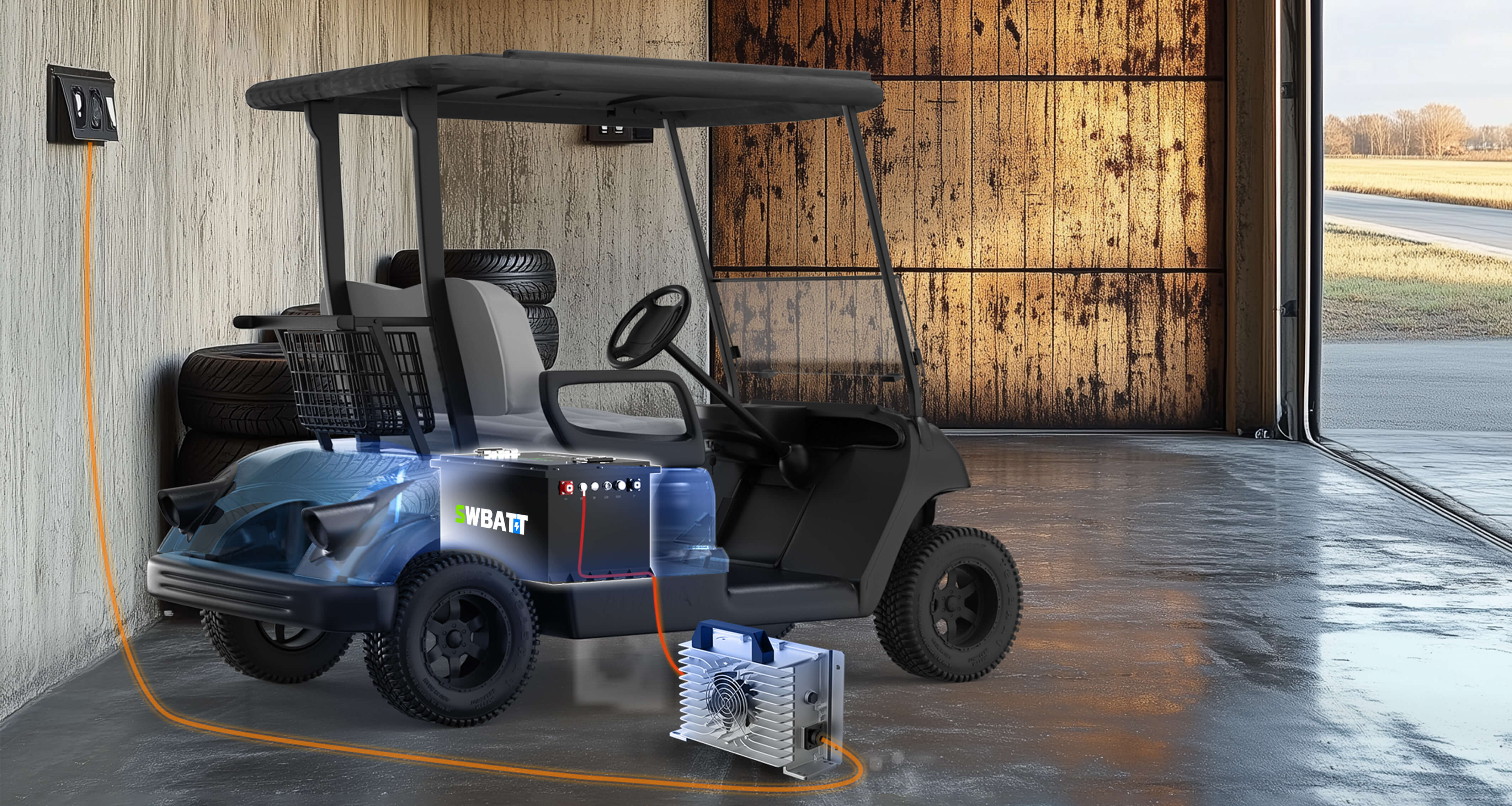Introduction
Table of Contents
ToggleAs a leading manufacturer of lithium battery solutions for electric vehicles, we understand that seemingly minor details, like golf cart weight, can significantly impact your business. Whether you’re managing a golf course, running a dealership, or supplying carts to resorts, understanding the weight of your fleet is crucial for transportation, storage, performance, and even regulatory compliance. This comprehensive guide dives into how much a golf cart weighs, covering electric and gas-powered models, exploring the factors that influence weight, and highlighting the often-overlooked advantages of lighter lithium-powered carts.
Decoding Golf Cart Weight: Averages and Key Models
The simple question, “How much does a golf cart weigh?” has no one-size-fits-all answer. Weight varies considerably depending on:
- Power Source: Electric vs. Gas
- Model and Manufacturer: Club Car, EZGO, Yamaha, and others have different designs.
- Seating Capacity: 2-seater, 4-seater, 6-seater, or even 8-seater models exist.
- Accessories: Enclosures, cargo boxes, lift kits, and other add-ons increase weight.
- Batteries: Lead-acid or Lithium battery.
However, we can establish some general ranges:
- Electric Golf Carts (with Lead-Acid Batteries): Typically weigh between 900 and 1,100 pounds (408-500 kg). The batteries account for a significant portion of this weight (often 300-400 lbs).
- Electric Golf Carts (with Lithium Batteries) Can weigh significantly less, often between 600 and 800 pounds (272 and 363 kg), depending on battery capacity and configuration.
- Gas Golf Carts: Generally weigh between 600 and 800 pounds (272-363 kg) without the added weight of batteries.
Let’s look at some popular models (approximate dry weights without batteries unless otherwise noted):
- EZGO TXT (Electric): ~550-650 lbs (depending on configuration)
- EZGO RXV (Electric): ~650-700 lbs
- EZGO LIBERTY (Lithium): ~743 lbs
- Club Car Precedent i2 (Electric): ~600-700 lbs
- Club Car Onward (Electric): ~650-750 lbs
- Club Car DS (Gas): ~600-650 lbs
- Yamaha Drive2 (Electric): ~600-700 lbs
- Yamaha Drive2 (Gas): ~650-700 lbs
Important Note: These are approximate weights. Always refer to the manufacturer’s specifications for the exact weight of a specific model and configuration. The question “How heavy is a golf cart?” is best answered with precise data for the model.
Factors Influencing Golf Cart Weight: Beyond the Basics
As mentioned above, several factors contribute to the overall golf buggy weight. Understanding these factors is key to making informed decisions about your fleet:
- Battery Type (The Biggest Factor for Electric Carts): This is where the most significant weight difference lies. Traditional lead-acid batteries are heavy. A typical 36V or 48V lead-acid battery pack can add 300-400 pounds or more to the cart’s weight. Lithium batteries, however, can reduce that weight by 50-70%. This answers the question, “How much does an electric golf cart weigh?” dramatically differently, depending on the battery chemistry.
- Frame Material: Steel frames are heavier than aluminum frames. While most golf carts use steel for durability, some higher-end models may incorporate aluminum components to reduce weight.
- Motor and Controller: Larger, more powerful engines and controllers tend to be heavier.
- Seating Capacity: A 4-seater cart will weigh more than a 2-seater, and a 6-seater will weigh even more.
- Accessories: Every add-on contributes to the overall weight. Consider the weight of:
- Enclosures (windshields, doors, roofs)
- Cargo boxes or utility beds
- Lift kits (for off-road use)
- Sound systems
- Custom seats
- Light bars
- Tire and wheel: Larger tires and wheels mean more weight.
Electric vs. Gas Golf Carts: A Weight and Performance Comparison
While this article focuses primarily on weight, it’s important to briefly compare electric and gas golf carts in a broader context:
Table 1: Electric vs. Gas Golf Cart Comparison
| Характеристика | Electric Golf Cart (Lead-Acid) | Electric Golf Cart (Lithium) | Gas Golf Cart | Source |
| Вес | Heavier (900-1100 lbs) | Lighter (600-800 lbs) | Lighter (600-800 lbs) | Manufacturer specifications; Industry reports |
| Running Costs | Lower (electricity) | Lowest (electricity + less maintenance) | Higher (fuel) | Energy.gov; Industry analysis |
| Техническое обслуживание | High (battery watering, etc.) | Очень низкий | Moderate (oil changes, etc.) | Manufacturer recommendations |
| Noise Level | Quiet | Quietest | Noisy | Independent testing; User reviews |
| Emissions | Zero (at point of use) | Zero (at point of use) | High (CO2, other pollutants) | EPA; Environmental studies |
| Power/Torque | Good, but can fade with battery drain | Excellent and consistent | Good, consistent | Independent testing; User reviews |
| Продолжительность жизни | Shorter (battery replacements needed) | Longest (fewer battery replacements) | Moderate | Industry data; Manufacturer warranties |
| Первоначальная стоимость | Moderate | Highest | Lowest | Market analysis; Dealer pricing |
| Resale value | Lower | Higher | Moderate | Kelley Blue Book |
Key Takeaways from the Table:
- Lithium Bridges the Gap: Lithium batteries significantly reduce the weight of electric carts, making them comparable to gas carts in terms of weight but with all the benefits of electric power.
- Long-Term Cost: While gas carts may have a lower initial purchase price, their higher running costs and emissions make them less attractive in the long run, especially for businesses concerned with sustainability. The question of “how much does a club car golf cart weigh” (or any other brand) becomes secondary to the overall TCO.
Discover Advanced Lithium Battery Solutions
Explore SWBATT‘s innovative LifePO4 batteries for electric vehicles, energy storage, and more. Tailored solutions to meet your energy needs with efficiency and sustainability.
The Impact of Golf Cart Weight on Your Operations
The weight of your golf carts has several practical implications:
- Transportation: Weight is a significant factor if you need to transport your carts (for example, between courses or for service). Heavier carts require larger trailers and more powerful tow vehicles, increasing transportation costs. This is particularly relevant when considering the weight of an Ezgo golf cart versus a lighter lithium-powered alternative.
- Storage: Weight can impact storage requirements. Heavier carts may require reinforced flooring or specialized lifting equipment.
- Turf Impact: Heavier carts can cause more wear and tear on the turf, especially in wet conditions. This can lead to increased maintenance costs and potential damage to the course.
- Performance: Lighter carts generally accelerate faster, handle better, and have longer runtimes (especially electric carts with lithium batteries).
- Regulations: Some jurisdictions may have weight restrictions for golf carts used on public roads or pathways.
Real-World Example:
A resort in Florida switched its fleet of 50 golf carts from lead-acid to lithium-powered electric. The reduced weight (approximately 200 lbs per cart) resulted in:
- Lower Transportation Costs: They could transport more carts per trailer load.
- Reduced Turf Damage: Less compaction and rutting, especially during the rainy season.
- Improved Battery Life: The lighter load extended the range of the carts, allowing for more rounds per charge.
- Positive Customer Feedback: Guests appreciated the smoother, more responsive ride.
H1: Frequently Asked Questions (FAQs)
Q1: How much does a 48 volt golf cart weigh?
A: The voltage (48V) doesn’t directly determine the weight. A 48V golf cart can weigh anywhere from 600 lbs to over 1100 lbs, depending on whether it uses lithium or lead-acid batteries, its size, and accessories.
Q2: What is the lightest golf cart?
A: Generally, electric golf carts with lithium batteries are the lightest. Some specialized, lightweight models can weigh under 600 lbs.
Q3: Can I reduce the weight of my existing golf cart?
A: Yes. The most significant weight reduction can be achieved by switching from lead-acid to lithium batteries. Removing unnecessary accessories can also help.
Ready to explore the benefits of lighter, more efficient lithium battery solutions for your golf cart fleet? Contact our expert team today for a personalized consultation and a custom quote. We’ll help you determine the optimal battery system to reduce weight, improve performance, and lower your operating costs.




